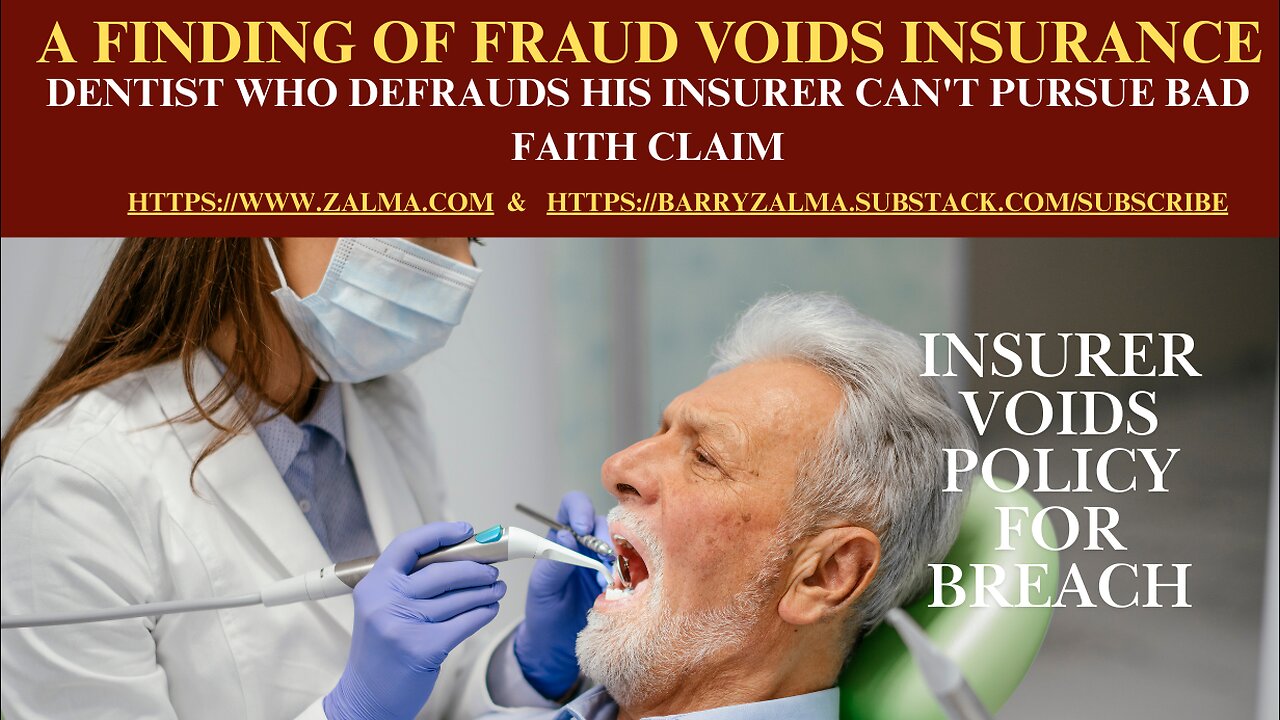
Claims Commandment III: Thou Shall Communicate Often With The Third Party Insured and the Claimant
Barry Zalma
Read the full article at https://www.linkedin.com/pulse/claims-commandments-barry-zalma-esq-cfe-1c and see the full video at https://rumble.com/v1qrtao-claims-commandments.html and at at https://zalma.com/blog plus more than 4350 posts.
Insurance claims is a service business. The claims person – whether acting for the insurer or the insured – provides a service to the insured and the insurer. Communication is essential to providing the service promised by the insurance policy.
In some states, like California, communications are required by regulation:
"Every insurer shall disclose to a first party claimant or beneficiary, all benefits, coverage, time limits or other provisions of any insurance policy issued by that insurer that may apply to the claim presented by the claimant. When additional benefits might reasonably be payable under an insured’s policy upon receipt of additional proofs of claim, the insurer shall immediately communicate this fact to the insured and cooperate with and assist the insured in determining the extent of the insurer’s additional liability." [10 CCR 2695.4 (a)]
This means that the initial written contact with an insured in a first party property claim should advise the insured of all benefits, coverage, time limits, or other provisions of any insurance policy issued by that insurer that may apply to the claim presented by a first party insured.
When a claims person receives any communication from an insured, third party claimant, or a representative of the insured or claimant regarding a claim that reasonably suggests that a response is expected, he or she should immediately after receipt of that communication furnish the claimant with a complete response based on the facts as then known by the claims person. Some regulations allow the claims person up to 20 days to respond. Good claims handling requires an immediate response. If the response is oral rather than written it should be noted in the claims person’s file or log.
Upon receiving notice of claim, every insurance claims person should immediately do the following:
Acknowledge receipt of such notice to the claimant or insured.
If the acknowledgment is not in writing, a notation of acknowledgment must be made in the insurer’s claim file and dated.
Provide to the claimant or insured necessary forms, instructions, and reasonable assistance, including but not limited to, specifying the information the claimant must provide for proof of claim;
Begin any necessary investigation of the claim.
The investigation must be “real.” The claims person or investigator must actually contact the insured, the claimant, the witnesses and start collecting the documents needed to complete the claims investigation. Investigation and must be started immediately after receiving notice of claim.
Merely reading a policy wording and notice of claim is not the beginning of an investigation or an investigation at all.
Upon receiving proof of claim, every insurance claims person should immediately accept or deny the claim, in whole or in part. Proof of claim is not the proof of loss required as a condition of the policy. A proof of claim is where the insured provides the insurer sufficient information to allow the insurer to determine part or all of the insured’s claim. The amounts accepted or denied shall be clearly documented in the claim file unless the claim has been denied in its entirety.
Some states allow up to 40 calendar days to respond to a proof of claim. If more time is required to determine whether a claim should be accepted and/or denied in whole or in part, the claims person should provide the claimant or insured written notice of the need for additional time.
The written notice should specify any additional information the insurance claims person requires in order to decide. The written notice should state any continuing reasons for the insurer’s inability to decide. Thereafter, the written notice concerning additional time to complete an investigation, should be provided to the insured at least every thirty calendar days until a determination is made.
If the determination cannot be made until some future event occurs, then the claims person should comply with this continuing notice requirement by advising the claimant and/or insured of the situation and providing an estimate as to when the determination can be made.
Effective diary systems are essential to professional claims handling or the Regulations will be violated with regularity.
Every claims person must conduct and diligently pursue a thorough, fair and objective investigation and should not persist in seeking information not reasonably required for or material to the resolution of a claim dispute.
The claims person’s obligation is not limited to communication with the insured or the claimant.
In addition, the claims person and the insurer have an obligation to communicate with the state, police agencies, or prosecutors if they suspect that an insured or a claimant is attempting fraud.
In California, and most states, such a communication is absolutely immune from suit. Pursuant to section California Civil Code Section 47(b), a privilege is stated that bars a civil action for damages for communications made “[i]n any (1) legislative proceeding, (2) judicial proceeding, (3) in any other official proceeding authorized by law, or (4) in the initiation or course of any other proceeding authorized by law and reviewable pursuant to [statutes governing writs of mandate],” with certain statutory exceptions.
The privilege established by this subdivision often is referred to as an “absolute” privilege, and it bars all tort causes of action except a claim for malicious prosecution. “The absolute privilege in section 47 represents a value judgment that facilitating the “utmost freedom of communication between citizens and public authorities whose responsibility is to investigate and remedy wrongdoing” is more important than the “‘occasional harm that might befall a defamed individual.’” (See Imig v. Ferrar (1977) 70 Cal. App. 3d 48, 55-56 [138 Cal. Rptr. 540].)”
To fulfill Commandment III the claims person must communicate promptly and often with the insured, the claimant and the insured (if a third party claim) and counsel for each. In doing so the claims person establishes a rapport with the insured and/or claimant and will make resolution of the claim easier.
No claims person should ever misrepresent or conceal benefits, coverages, time limits or other provisions of the policy from the insured or the claimant.
(c) 2022 Barry Zalma & ClaimSchool, Inc.
Barry Zalma, Esq., CFE, now limits his practice to service as an insurance consultant specializing in insurance coverage, insurance claims handling, insurance bad faith and insurance fraud almost equally for insurers and policyholders. He practiced law in California for more than 44 years as an insurance coverage and claims handling lawyer and more than 54 years in the insurance business. He is available at http://www.zalma.com and [email protected] and receive videos limited to subscribers of Excellence in Claims Handling at locals.com https://zalmaoninsurance.locals.com/subscribe.Subscribe to Excellence in Claims Handling at https://barryzalma.substack.com/welcome.
Write to Mr. Zalma at [email protected]; http://www.zalma.com; http://zalma.com/blog; daily articles are published at
Zalma on Insurance
Insurance, insurance claims, insurance law, and insurance fraud .
By Barry Zalma
Go to the podcast Zalma On Insurance at https://anchor.fm/barry-zalma; Follow Mr. Zalma on Twitter at https://twitter.com/bzalma; Go to Barry Zalma videos at Rumble.com at https://rumble.com/c/c-262921; Go to Barry Zalma on YouTube- https://www.youtube.com/channel/UCysiZklEtxZsSF9DfC0Expg; Go to the Insurance Claims Library – https://zalma.com/blog/insurance-claims-library
Dentist Who Defrauds His Insurer Can’t Pursue Bad Faith Claim
Post number 5295
Read the full article at https://www.linkedin.com/pulse/finding-fraud-voids-insurance-barry-zalma-esq-cfe-yizic, see the video at and at and at https://zalma.com/blog plus more than 5250 posts.
In Andy Fletcher Montano v. The Dentists Insurance Company v. Dr. Sandy Fletcher Montano DDS, PLLC, Deer Park Dental, PLLC, No. 24-5202, United States Court of Appeals, Ninth Circuit (February 19, 2026) Sandy Fletcher Montano appealed pro se from the district court’s summary judgment in his diversity action against The Dentists Insurance Company (“TDIC”) alleging claims stemming from its denial of insurance coverage under a fraud clause in Montano’s policy.
ANALYSIS & DECISION
The Ninth Circuit concluded that the district court properly granted summary judgment on Montano’s claim for breach of contract because Montano ...

Declaratory Relief Granted to Insurer
Post number 5294
Suit for Defective Windows Excluded from Insurance
See the video at and at and at https://zalma.com/blog plus more than 5250 posts.
In Acuity v. Marion Glass And Mirror, Inc., No. 3:25-CV-00562-NJR, United States District Court, S.D. Illinois, Acuity, a mutual insurance company based in Wisconsin, filed a Complaint for Declaratory Judgment in the United States District Court for the Southern District of Illinois. Acuity sought a declaration that it has no duty to defend or indemnify its insured, Marion Glass and Mirror, Inc. (“Marion Glass”), in connection with a Third-Party Complaint brought by Samron Midwest Contracting, Inc. (“Samron”) in Williamson County.
Facts
The underlying lawsuit, filed in June 2023, involved allegations of property damage at the City of Marion’s Community Recreational Center due to allegedly faulty construction work ...

Neither Defense nor Indemnity Available Because of Exclusion
Post number 5293
See the video at and at and at https://zalma.com/blog plus more than 5250 posts.
You’re reading from the free part of Excellence in Claims Handling. You should consider joining as a paid member to get full access to articles for members only, to our news, analysis, insurance coverage, claims, insurance fraud and insurance webinars, by clicking at the “subscribe” button above.
Security at Low Income Housing to Risky for Insurer
In Everest Indemnity Insurance Company v. Kates Detective & Security Services Agency, Inc., et al., No. 25 C 5488, United States District Court, N.D. Illinois, Eastern Division (February 18, 2026) dealt with a clear and unambiguous exclusion.
Facts
Everest Indemnity Insurance Company sued Kates Detective & Security Services Agency, Inc. and the Chicago Housing Authority (CHA) seeking a ...

Contract Breaches that Allow Multiple Different Grounds to Make a Policy Void
More from Excellence in Claims Handling Substack for Subscribers Only. You can Subscribe to my substack at https://barryzalma.substack.com/subscribe
Posted on February 24, 2026 by Barry Zalma
You’re reading from the free part of Excellence in Claims Handling until you reach the paywall. You should consider joining as a paid member to get full access to articles for members only, to our news, analysis, insurance coverage, claims, insurance fraud and insurance webinars, by clicking at the “subscribe” link below.
If an insured breaches one or more material warranties and increases the risk covered by the policy, the contract may be voided by the insurer, depending on the jurisdiction. It is, therefore, essential that every claims investigation include efforts to establish compliance with every warranty.
In Cummings v. Fire Insurance Exchange, 292 Cal. App. 3d 1407, 249 Cal. Rptr. 568 (1988), the Court of Appeal ...

Passover for Americans
Posted on February 19, 2026 by Barry Zalma
“The Passover Seder For Americans”
For more than 3,000 years Jewish fathers have told the story of the Exodus of the enslaved Jews from Egypt. Telling the story has been required of all Jewish fathers. Americans, who have lived in North America for more than 300 years have become Americans and many have lost the ability to read, write and understand the Hebrew language in which the story of Passover was first told in the Torah. Passover is one of the many holidays Jewish People celebrate to help them remember the importance of G_d in their lives. We see the animals, the oceans, the rivers, the mountains, the rain, sun, the planets, the stars, and the people and wonder how did all these wonderful things come into being. Jews believe the force we call G_d created the entire universe and everything in it. Jews feel G_d is all seeing and knowing and although we can’t see Him, He is everywhere and in everyone.We understand...
Passover for Americans
Posted on February 19, 2026 by Barry Zalma
Read the full article at https://www.linkedin.com/pulse/passover-americans-barry-zalma-esq-cfe-5vgkc.
“The Passover Seder For Americans”
For more than 3,000 years Jewish fathers have told the story of the Exodus of the enslaved Jews from Egypt. Telling the story has been required of all Jewish fathers. Americans, who have lived in North America for more than 300 years have become Americans and many have lostthe ability to read, write and understand the Hebrew language in which the story of Passover was first told in the Torah.
Passover is one of the many holidays Jewish People celebrate to help them remember the importance of G_d in their lives. We see the animals, the oceans, the rivers, the mountains, the rain, sun, the planets, the stars, and the people and ...


















